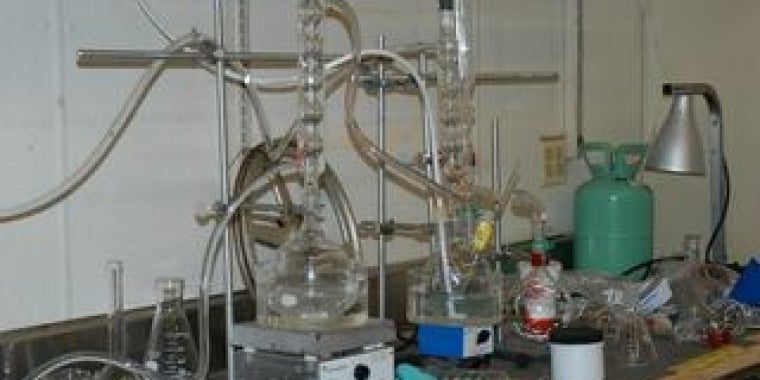
Senate approves O'Mara's legislation to combat proliferation of meth labs
Thomas F. O'Mara
April 23, 2013
-
ISSUE:
- Controlled Substances

Albany, N.Y., April 23—While police and firefighters in the city of Elmira today were on the scene of a suspected meth lab, the New York State Senate approved, by a strong bipartisan vote of 57 to 5, legislation sponsored by Senator Tom O’Mara (R-C, Big Flats) to further outlaw the operation of clandestine methamphetamine labs by increasing the criminal penalties for the possession of meth manufacturing material and the unlawful manufacture of meth, implementing a series of increasingly severe felony offenses.
[watch Senator O'Mara's comments on the flooor of the Senate]
O’Mara’s legislation (S.3639) especially sends a strong message to would-be meth makers: keep it up and you could go to prison for life. That’s because the measure includes a provision making it a Class A-1 felony, punishable by a maximum sentence of life in prison, for criminals convicted of operating a meth lab for the second time in five years or in the presence of a child under the age of 16. That’s currently a Class B felony that carries a maximum prison sentence of 25 years. The punishment for the possession of methamphetamine manufacturing material in the first degree would increase from a Class E to a Class D felony, punishable by up to seven years in prison.
“We need to send a strong message that we’re not going to tolerate the operation of meth labs. Meth labs pose unacceptable risks to our neighborhoods, threaten the safety of police officers and first responders, and burden local systems of health care, criminal justice and social services,” said O’Mara. “Our laws need to keep pace with the goal of putting meth manufacturers out of business in New York State. The only byproducts of meth are addiction, tragedy and violence.”
[see stories in the April 24th Corning Leader attached below]
He highlighted the increasing frequency of meth-related arrests and other incidents across the Southern Tier and Finger Lakes regions over the past few years as the impetus for imposing stricter criminal penalties for possessing the material to make or for manufacturing the dangerous and highly addictive drug.
O’Mara also praised local awareness and education efforts. He highlighted a Meth Lab Recognition seminar being sponsored in Elmira on Wednesday, April 24, by the Bath-based Institute for Human Services. The Institute’s seminar will reach out to health and human service professionals, especially those who provide home visits or work in neighborhoods in other ways, to provide information on the warning signs of a meth lab and how best to report it. Find out more at www.ihsnet.org.
O’Mara stressed that meth manufacturing involves the use of highly explosive, flammable and toxic chemicals, and meth labs pose a significant public health and safety threat, especially if they’re located in residential neighborhoods.
According to the United States Department of Justice, methamphetamine is one of the nation's greatest drug threats. A recent department report noted that the drug is at its highest levels of availability and purity -- and lowest cost -- since 2005. That's attributed to rising Mexican imports, but also because of increased small-scale domestic production.
O’Mara is also sponsoring legislation that would increase the criminal penalties for the possession and/or sale of meth to bring the penalties more in line with the penalties for possessing and/or selling cocaine and heroin (S.3289). That legislation is currently in the Senate Codes Committee.
“These actions would make it easier to prosecute meth crimes and impose tougher criminal penalties for manufacturing, possessing and selling meth,” said O’Mara. “We also hope tougher anti-meth laws will act as a stronger deterrent among our young people at risk of falling prey to this cycle of addiction and tragedy.”
O’Mara said that the Legislature and then-Governor George Pataki enacted New York’s first comprehensive anti-meth law in early 2006 following the release of a State Commission on Investigation (SIC) report warning that methamphetamine would become an increasingly dire public health and safety threat unless New York adopted new and tougher laws to combat the drug's proliferation.
Share this Article or Press Release
Newsroom
Go to Newsroom


